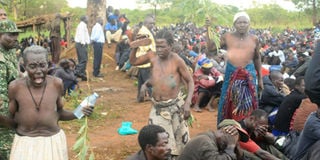Nude protests: the Acholi signal of distress

About two weeks ago, ministers and other senior government officials, who had gone to Amuru District for a border demarcation exercise, were treated to a rare sight when elderly women stripped, protesting against the exercise. File PHOTO
What you need to know:
Women in Apaa Village, which lies on the border of Amuru and Adjumani districts, recently stripped naked before Lands minister Daudi Migereko and Internal Affairs minister Aronda Nyakairima, protesting against a new demarcation exercise. Julius Ocungi puts this desperate plea in perspective.
On April 16, a long-running land dispute in northern Uganda took a new twist when female residents of Apea Village stripped before government ministers to protest plans to draw a boundary between the districts of Amuru and Adjumani.
The nude act has had many reactions, with many people wondering why elderly African women would strip.
Cultural context
In the Acholi culture, women undressing in public is a multi-faceted gesture. According to Nicholas Opoka, 80, a resident of Gulu Municipality, when a woman exposes her nakedness or points her breasts at you, it means trouble and a curse is underway for the person.
“In our culture, that dates back thousands of years, this practice is not new. When you attack a defenceless woman, or plot to grab her property or when her children drive her to the wall, she has no option, she either undresses or uses her breast, to cast a spell on you,” he says.
Ridiculous as this may seem, Opoka says many people are criticising the women without first understanding the cultural background.
He says: “In Acholi, when women are deeply touched, annoyed or troubled with a seemingly powerful opponent, this is the distress expression.
“The women could not physically fight back and neither could their sons because they are not violent. So, with nothing else to do, the mothers find refuge in tradition.”
Asked what the implications of last week’s nude protests are, Opoka says the only redress for the affected persons would be an apology and rituals to appease the gods to reverse the spell.
Who can perform these acts?
The 80-year-old says even men can carry out a similar protest and achieve the same results.
He says men can pull out their genitals and point them at the attacker.
Chief (Rwot) Jeremiah Bongjane of the Patiko Clan in Gulu District echoes Opoka’s words. However, he adds that this is a rare occurrence that only happens as a last resort.
“This is a once in a while occurrence, and it is triggered by a great cause.”
Justification
Joyce Bongomin, 51, a resident of Koro Sub-county in Gulu District, says the elderly women stripping is justifiable. “Elderly women stripping, moreover before children, was to protect what will feed their grandchildren in future, is an act that has been well thought out.
She adds: “Any sensible African would never execute their plan after the sight because women always protect their nakedness.”
Certainly, people from all corners of the globe will be affected in one way or the other if an elderly woman stripped to protect what they hold dear.
One of the elders who was disturbed by the protest, Acholi Paramount Chief David Onen Acan II, in a press conference recently, condemned the nude protest. “There were other means the desperate elderly mothers could have used to solve the dispute.”
But to many, who presumably “claimed” they understood the Acholi culture well enough in its context and dynamics, they applauded the move, arguing that the women had no option but to go traditional.
Precedence
This is not the first time a nude riot is happening. In 2012, women in Lakang, Amuru Sub-county stripped before the then Amuru RDC, Milton Dongo, who had led a delegation to visit the land that the government proposed for sugarcane growing by Madhvani Group of companies.
Does the end justify the means?
Although some circles have criticised the act as disrespecting Acholi culture and a poor approach of solving disputes, it seems the women achieved their goal, considering that the demarcation exercise was suspended.
Contention
The 40sq contested land located in Pabbo Sub-county, Amuru District borders Adjumani District and has over the years been claimed by Uganda Wildlife Authority, which claims it is a game reserve. The land is home to more than 11,000 residents.
What others say
The chairperson of Acholi Parliamentary Group, Reagan Okumu, in an interview recently, commended the acts of women, stripping over their land. He says they (the women) had no option.
“Despite the wide condemnation going on, these women in fact, our mothers and grandmothers had no option and traditionally our vulnerable women stripped because that is what they can do,” he said.
Joseph Mwangi, a Kenyan national, said it was a shock that women can strip when agitated.
“I had never seen or heard about women stripping in protest,” he said.




